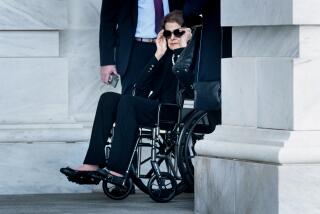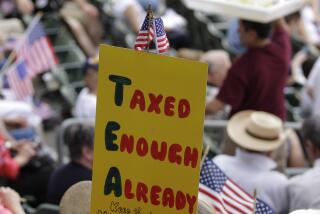NAFTA : Clinton’s Search for a Political Base
- Share via
Bill Clinton is a politician in search of a base. What should be his natural base extends from the reluctant to the rebellious. To add insult to injury, in his efforts to expand his support beyond the plurality that elected him, the President has stretched out his hand to the business community--and they’ve given him the back of theirs.
Clinton has tried to be good to business. They are the voters who backed Ross Perot last year and could build the President a majority if they supported him now. Clinton has taken their side on the North American Free Trade Agreement, making passage of George Bush’s treaty a test of his presidency and risking his relationship with organized labor. He pushed through an economic package that provided more security for bond traders than for big-city mayors. He crafted his health-insurance reform plan with the interests of big business in mind, resisting liberal arguments for a Canadian-style single-payer plan and modifying the mandate of managed competition to allow large employers to continue to go their own way.
What has he gotten in return? Not much, at least so far. Business may be lobbying individual members of Congress for NAFTA in Washington, but there has been little effort to make it easier for them, or the President, in their districts.
While organized labor saturates the radio waves with protests of NAFTA, and while Perot takes his show on the road, taunting Clinton and threatening members of Congress, nary a word in defense of the President, or NAFTA, can be heard from business. There are no radio ads, no mailings, no television infomercials. Outside of Washington, the paid debate on NAFTA has been a one-sided game--a fact that helps explain public-opinion polls showing many oppose the treaty, as well as the number of congressmen and women who privately understand the importance of free trade but are afraid of their constituents who don’t.
Meanwhile, the President’s natural base isn’t there for him, either. Unlike Ronald Reagan, who could count on his conservative supporters to stand by him even in the depths of the 1982 recession, Clinton can’t even count on the people he’s helped. Clinton is the best friend organized labor has had in the White House in two decades--but that message has been lost in the NAFTA debate, with organized labor taking the lead in convincing its members that their jobs are at stake and their President is against them. Clinton’s frustration boiled over last Sunday, when he complained about labor’s “muscle-bound” tactics in opposing NAFTA.
Labor leaders may be prepared to forgive and forget that criticism, Washington-style, once the debate is over. But the rank and file doesn’t necessarily play by those rules--particularly when union leadership has spent far more money telling America, and its members, what’s wrong with Clinton than what’s right.
Nor is there any love lost between Clinton and the liberal community. Unlike his predecessors, this President opposes discrimination based on sexual orientation and does not view AIDS through the prism of the religious right. But the handling of the gays in the military issue, and the apparent flip-flop by the President, left bruised relationships with the gay community.
Feminists cheered the selection of Ruth Bader Ginsburg to the Supreme Court, and no longer have to worry that Roe vs. Wade might be overruled. Even so, they’re preparing to go to battle against the Administration if there is any compromise on funding abortions in the health-care plan or if abortion-rights opponents are appointed to any judgeships in the country.
In the same way, environmentalists, in a situation undreamed of under Reagan, can look to one of their own at the top of the Environmental Protection Agency the Interior Department and even in the vice presidency. But they are, nonetheless, split over NAFTA and less than enthusiastic in their approach to the Administration. And liberal health-care activists complain that the President has already given away too much with his health-care plan, and many are supporting an alternative, single-payer plan that currently has more sponsors in the House than the President’s does.
Blacks alone continue to be loyal to the President, if the survey data are right, but black leaders in Washington have been complaining loudly about the delay in filling the civil-rights job at Justice. John Payton, a talented Washington lawyer who is the Administration’s apparent choice, has won mixed reviews from black members of Congress concerned about Payton’s lack of experience on voting rights and its impact on their seats.
Meanwhile, many conservative Democrats, once ideological soul mates of the President in his Democratic Leadership Council days, feel he’s gone too far on health care and proposed too few cuts in the budget. They’re making noises about forming their own coalition with Republicans on these issues, and they’re pushing a balanced-budget amendment that the President opposes. While Clinton desperately needs their support on NAFTA, Hillary Rodham Clinton gave notice last week that there would be no compromising with conservatives on the health-care issue. She said the Administration would prefer to deal with moderate Republicans than with the President’s old allies.
With no solid base to call his own, nothing is easy for this Administration. Every major vote is inevitably a squeaker. And Perot, who received 19% of the vote in November, continues to have a place at the table--even though his popularity in the polls has dramatically dipped since the Tuesday debate.
Clinton’s inability to count on a solid base of support, is partly a reflection of the breadth of his own political agenda. Because the Administration is tackling so many problems at once, shifting coalitions are inevitable. If that means there are no permanent enemies, it also means there are no permanent friends.
But it is also a reflection of the general restiveness of the electorate, of voters’ lack of trust in government and lack of faith in politics. The same horse that carried Clinton into office carried Democrats out in New Jersey, Virginia and New York. Whether the issue is NAFTA, health care or the budget, voters who claim they want change are wary of it; voters who say they want the government to act are even more afraid of what it might do to them.
Building a base under the best of circumstances is more difficult today than a decade ago, and for Clinton, trying to tackle half a dozen major problems at once, and faced with a still sluggish economy--at least here in California--and a still dangerous world, these are not the best of times. Cynicism has become America’s natural state when it comes to politics, and cynicism and loyalty do not go hand-in-hand.
More to Read
Sign up for Essential California
The most important California stories and recommendations in your inbox every morning.
You may occasionally receive promotional content from the Los Angeles Times.













